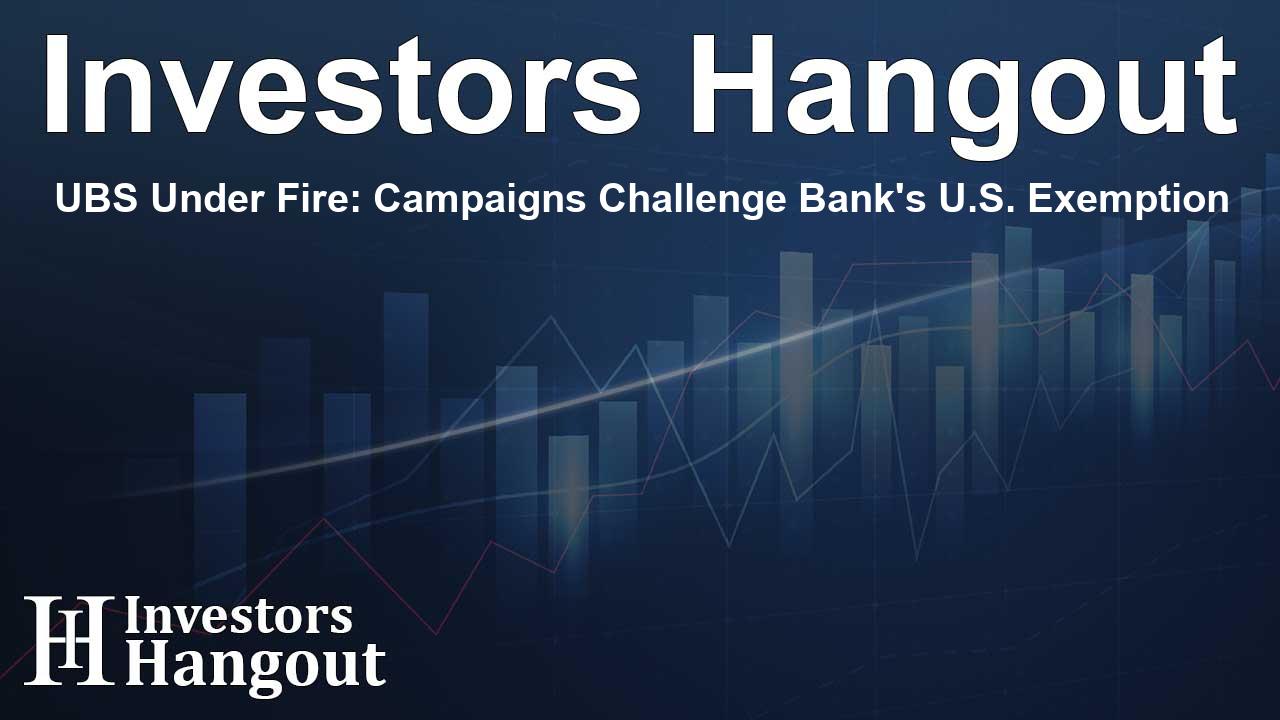UBS Under Fire: Campaigns Challenge Bank's U.S. Exemption

UBS Faces Growing Opposition Over U.S. Operations
Recent reports indicate that UBS, a well-known Swiss bank, is under fire from campaigners who are advocating for the loss of its exemption from U.S. regulations. This exemption currently allows UBS to operate within the vast U.S. pension market, which manages a staggering $30 trillion in assets. The tension is rising as the bank has faced significant penalties for various offenses over the years.
Department of Labor's Review of UBS's Exemption
The U.S. Department of Labor is currently evaluating UBS's application that seeks to extend its operating exemption in America. This review comes amidst concerns raised by numerous activists who argue that UBS's track record of approximately $20 billion in penalties spanning nearly 100 infractions between 2000 and 2023 epitomizes a dangerous precedent. They point out that institutions like UBS should not have a foothold in managing American pension assets given their history.
The Implications of Violating Banking Rules
Under existing U.S. regulations, financial institutions that have been found guilty of criminal activities or are under sanctions by supervisory bodies are barred from managing pension funds. This regulation is in place to protect the retirement savings of hardworking Americans. However, UBS's legal team has asserted that the issues leading to their penalties stemmed from actions of individual employees rather than systematic issues within the bank.
The Fight for Accountability
On the front lines of this battle is James Henry, a representative from the Tax Justice Network, an organization that fights against tax evasion and exploitation of financial loopholes. Henry has emphasized that penalties imposed on banks often have little deterrent effect, as the profits generated from illicit activities frequently far outweigh the financial penalties. This creates a situation where criminal behavior remains financially attractive, as none of the high-ranking officials face significant repercussions.
Historical Context of UBS's Legal Challenges
UBS's problematic history includes a notable conviction in France, where it was charged with enabling wealthy clients to evade taxes. The fallout from this case resulted in a hefty fine of 4.5 billion euros, which was later reduced to 1.8 billion euros upon appeal. Such penalties demonstrate a pattern of behavior that activists argue should disqualify the bank from operating in critical markets like the U.S.
Ongoing Legal Issues and Settlements
Additionally, UBS's challenges extend beyond its own actions, as the bank has also inherited legal complications following its acquisition of Credit Suisse. This takeover has placed UBS in a precarious legal position, further complicating its standing with regulators. On top of that, UBS recently agreed to pay $46 million to settle an antitrust lawsuit, showing that legal troubles have become a recurrent theme for the bank.
The Future of UBS in the U.S. Market
As UBS eagerly awaits the decision from the Department of Labor regarding its exemption application, the atmosphere is charged with uncertainty. The bank’s representatives have expressed confidence, stating that they have submitted a detailed application consisting of about 500 pages, owing to the importance of maintaining their operations in such a lucrative market.
The Call for Change in Banking Regulations
This situation has sparked a broader conversation about the need for stricter regulations for financial institutions operating in high-stakes markets. Advocates argue that it is critical to hold banks accountable for their past actions and to ensure that U.S. workers' retirement funds are managed by responsible entities. The ongoing discussions around this exemption could lead to significant shifts in how banking regulations are enforced in the future.
Frequently Asked Questions
What is the main issue UBS is facing?
UBS is facing challenges from campaigners who want to revoke its exemption allowing it to operate in the U.S. pension market due to its history of penalties and legal infractions.
Why is the U.S. Department of Labor reviewing UBS's exemption?
The review is triggered by concerns regarding UBS's criminal history and the implications of allowing a bank with such a track record to manage U.S. pension assets.
What penalties has UBS faced in the past?
UBS has paid around $20 billion in penalties for nearly 100 offenses from 2000 to 2023, highlighting a troubled history with compliance and regulatory standards.
How does UBS justify its operations in the U.S. despite past issues?
UBS's lawyers argue that the problems arose from individual staff members and not systemic failures, thus justifying their continued operations in the U.S.
What impact could this situation have on the banking industry?
This situation may prompt discussions about stricter regulatory measures, potentially reshaping how financial institutions are governed to protect consumer interests.
About Investors Hangout
Investors Hangout is a leading online stock forum for financial discussion and learning, offering a wide range of free tools and resources. It draws in traders of all levels, who exchange market knowledge, investigate trading tactics, and keep an eye on industry developments in real time. Featuring financial articles, stock message boards, quotes, charts, company profiles, and live news updates. Through cooperative learning and a wealth of informational resources, it helps users from novices creating their first portfolios to experts honing their techniques. Join Investors Hangout today: https://investorshangout.com/
Disclaimer: The content of this article is solely for general informational purposes only; it does not represent legal, financial, or investment advice. Investors Hangout does not offer financial advice; the author is not a licensed financial advisor. Consult a qualified advisor before making any financial or investment decisions based on this article. The author's interpretation of publicly available data shapes the opinions presented here; as a result, they should not be taken as advice to purchase, sell, or hold any securities mentioned or any other investments. The author does not guarantee the accuracy, completeness, or timeliness of any material, providing it "as is." Information and market conditions may change; past performance is not indicative of future outcomes. If any of the material offered here is inaccurate, please contact us for corrections.